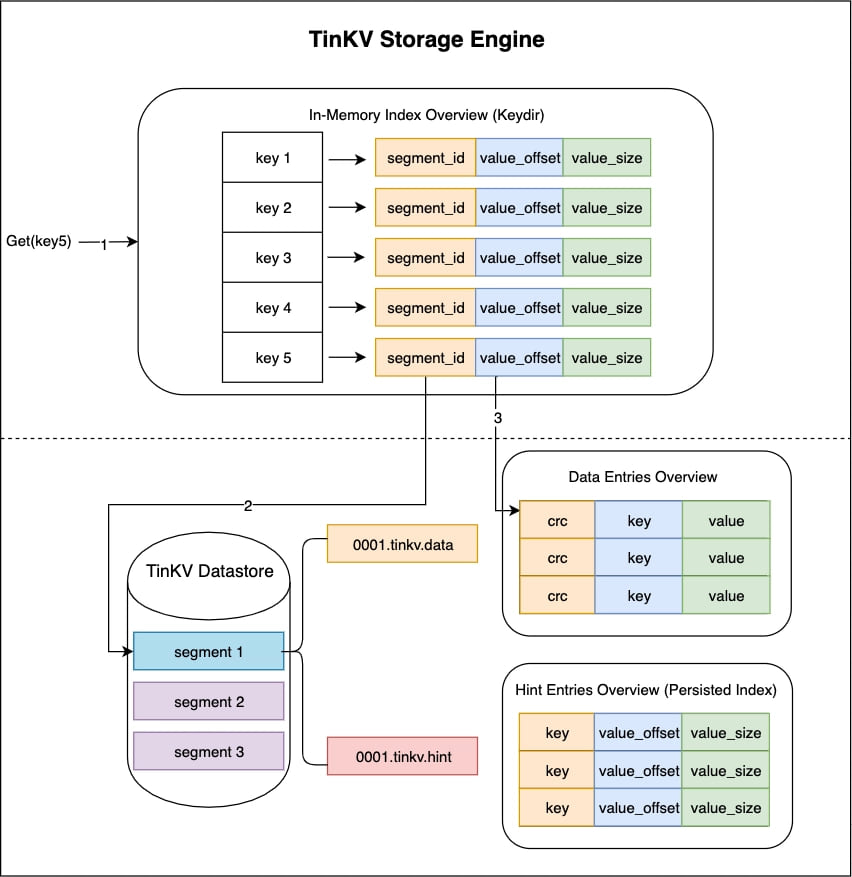11 个版本 (5 个重大更改)
| 0.10.0 | 2020 年 6 月 28 日 |
|---|---|
| 0.9.3 | 2020 年 6 月 27 日 |
| 0.8.0 | 2020 年 6 月 24 日 |
| 0.7.1 | 2020 年 6 月 21 日 |
| 0.5.1 | 2020 年 6 月 20 日 |
#184 in 数据库实现
97KB
2K SLoC
TinKV 是一个用 Rust 编写的简单快速键值存储引擎。受到 basho/bitcask 的启发,在参加 Talent Plan 课程 后编写。
注意:
- 请勿在生产环境中使用。
- 当前的 set/remove/compact 等操作不是线程安全的。
祝您编码愉快~


特性
- 可嵌入(使用
tinkv作为库); - 内置 CLI(《tt class="src-rs">tinkv);
- 内置兼容 Redis 的服务器;
- 可预测的读写性能。
使用方法
作为库
$ cargo add tinkv
完整的示例用法可以在 examples/basic.rs 中找到。
use tinkv::{self, Store};
fn main() -> tinkv::Result<()> {
pretty_env_logger::init();
let mut store = Store::open("/path/to/tinkv")?;
store.set("hello".as_bytes(), "tinkv".as_bytes())?;
let value = store.get("hello".as_bytes())?;
assert_eq!(value, Some("tinkv".as_bytes().to_vec()));
store.remove("hello".as_bytes())?;
let value_not_found = store.get("hello".as_bytes())?;
assert_eq!(value_not_found, None);
Ok(())
}
使用自定义选项打开
use tinkv::{self, Store};
fn main() -> tinkv::Result<()> {
let mut store = tinkv::OpenOptions::new()
.max_data_file_size(1024 * 1024)
.max_key_size(128)
.max_value_size(128)
.sync(true)
.open(".tinkv")?;
store.set("hello".as_bytes(), "world".as_bytes())?;
Ok(())
}
API
tinkv 存储的公共 API 非常易于使用
| API | 描述 |
|---|---|
存储::open(path) |
打开一个新或现有的数据存储。目录必须对 tinkv 存储可读写。 |
tinkv::OpenOptions() |
使用自定义选项打开一个新或现有的数据存储。 |
store.get(key) |
从数据存储中通过键获取值。 |
store.set(key,value) |
将键值对存储到数据存储中。 |
store.remove(key,value) |
从数据存储中删除一个键。 |
store.compact() |
将数据文件合并成更紧凑的形式。丢弃过时的段以释放磁盘空间。压缩后生成提示文件以加快启动速度。 |
store.keys() |
返回数据库中的所有键。 |
store.len() |
返回数据库中的键总数。 |
store.for_each(f: Fn(key,value) -> Result<bool>) |
遍历数据库中的所有键,并对每个条目调用函数 f。 |
store.stas() |
获取数据库当前的统计信息。 |
store.sync() |
强制将任何写入数据存储。 |
store.close() |
关闭数据存储,同步所有挂起的写入到磁盘。 |
运行示例
$ RUST_LOG=trace cargo run --example basic
RUST_LOG 级别可以是以下之一:[trace、debug、info、error]。
点击此处 | 示例输出。
$ RUST_LOG=info cargo run --example basic
2020-06-18T10:20:03.497Z INFO tinkv::store > open store path: .tinkv
2020-06-18T10:20:04.853Z INFO tinkv::store > build keydir done, got 100001 keys. current stats: Stats { size_of_stale_entries: 0, total_stale_entries: 0, total_active_entries: 100001, total_data_files: 1, size_of_all_data_files: 10578168 }
200000 keys written in 9.98773 secs, 20024.57 keys/s
initial: Stats { size_of_stale_entries: 21155900, total_stale_entries: 200000, total_active_entries: 100001, total_data_files: 2, size_of_all_data_files: 31733728 }
key_1 => "value_1_1592475604853568000_hello_world"
after set 1: Stats { size_of_stale_entries: 21155900, total_stale_entries: 200000, total_active_entries: 100002, total_data_files: 2, size_of_all_data_files: 31733774 }
after set 2: Stats { size_of_stale_entries: 21155946, total_stale_entries: 200001, total_active_entries: 100002, total_data_files: 2, size_of_all_data_files: 31733822 }
after set 3: Stats { size_of_stale_entries: 21155994, total_stale_entries: 200002, total_active_entries: 100002, total_data_files: 2, size_of_all_data_files: 31733870 }
after remove: Stats { size_of_stale_entries: 21156107, total_stale_entries: 200003, total_active_entries: 100001, total_data_files: 2, size_of_all_data_files: 31733935 }
2020-06-18T10:20:14.841Z INFO tinkv::store > compact 2 data files
after compaction: Stats { size_of_stale_entries: 0, total_stale_entries: 0, total_active_entries: 100001, total_data_files: 2, size_of_all_data_files: 10577828 }
key_1 => "value_1_1592475604853568000_hello_world"
命令行界面(CLI)
安装 tinkv 可执行二进制文件。
$ cargo install tinkv
$ tinkv --help
...
USAGE:
tinkv [FLAGS] <path> <SUBCOMMAND>
FLAGS:
-h, --help Prints help information
-q, --quiet Pass many times for less log output
-V, --version Prints version information
-v, --verbose Pass many times for more log output
ARGS:
<path> Path to tinkv datastore
SUBCOMMANDS:
compact Compact data files in datastore and reclaim disk space
del Delete a key value pair from datastore
get Retrive value of a key, and display the value
help Prints this message or the help of the given subcommand(s)
keys List all keys in datastore
scan Perform a prefix scanning for keys
set Store a key value pair into datastore
stats Display statistics of the datastore
示例用法
$ tinkv /tmp/db set hello world
$ tinkv /tmp/db get hello
world
# Change verbosity level (info).
$ tinkv /tmp/db -vvv compact
2020-06-20T10:32:45.582Z INFO tinkv::store > open store path: tmp/db
2020-06-20T10:32:45.582Z INFO tinkv::store > build keydir from data file /tmp/db/000000000001.tinkv.data
2020-06-20T10:32:45.583Z INFO tinkv::store > build keydir from data file /tmp/db/000000000002.tinkv.data
2020-06-20T10:32:45.583Z INFO tinkv::store > build keydir done, got 1 keys. current stats: Stats { size_of_stale_entries:0, total_stale_entries: 0, total_active_entries: 1,total_data_files: 2, size_of_all_data_files: 60 }
2020-06-20T10:32:45.583Z INFO tinkv::store > there are 3 datafiles need to be compacted
客户端 & 服务器
tinkv-server 是一个与 Redis 兼容的键/值存储服务器。然而,并非所有 Redis 命令都受支持。可用的命令有
get<key>mget<key> [<key>...]set<key> <value>mset<key> <value> [<key> <value>]del<key>keys<pattern>ping[<message>]exists<key>info[<section>]commanddbsizecompact:手动触发压缩的扩展命令。
键/值对持久保存在目录 /usr/local/var/tinkv 下的日志文件中。服务器的默认监听地址为 127.0.0.1:7379,您可以使用 Redis 客户端连接到它。
快速入门
安装 tinkv-server 非常简单
$ cargo install tinkv
使用默认配置启动服务器(将日志级别设置为 info 模式)
$ tinkv-server -vv
2020-06-24T13:46:49.341Z INFO tinkv::store > open store path: /usr/local/var/tinkv
2020-06-24T13:46:49.343Z INFO tinkv::store > build keydir from data file /usr/local/var/tinkv/000000000001.tinkv.data
2020-06-24T13:46:49.343Z INFO tinkv::store > build keydir from data file /usr/local/var/tinkv/000000000002.tinkv.data
2020-06-24T13:46:49.343Z INFO tinkv::store > build keydir done, got 0 keys. current stats: Stats { size_of_stale_entries: 0,total_stale_entries: 0, total_active_entries: 0, total_data_files: 2, size_of_all_data_files: 0 }
2020-06-24T13:46:49.343Z INFO tinkv::server > TinKV server is listening at '127.0.0.1:7379'
使用 redis-cli 与 tinkv-server 通信
点击此处
$ redis-cli -p 7379
127.0.0.1:7379> ping
PONG
127.0.0.1:7379> ping "hello, tinkv"
"hello, tinkv"
127.0.0.1:7379> set name tinkv
OK
127.0.0.1:7379> exists name
(integer) 1
127.0.0.1:7379> get name tinkv
(error) ERR wrong number of arguments for 'get' command
127.0.0.1:7379> get name
"tinkv"
127.0.0.1:7379> command
1) "ping"
2) "get"
3) "set"
4) "del"
5) "dbsize"
6) "exists"
7) "compact"
8) "info"
9) "command"
...and more
127.0.0.1:7379> info
# Server
tinkv_version: 0.9.0
os: Mac OS, 10.15.4, 64-bit
# Stats
size_of_stale_entries: 143
size_of_stale_entries_human: 143 B
total_stale_entries: 3
total_active_entries: 1109
total_data_files: 5
size_of_all_data_files: 46813
size_of_all_data_files_human: 46.81 KB
127.0.0.1:7379> notfound
(error) ERR unknown command `notfound`
127.0.0.1:7379>
关于压缩
在每次调用 set 或 remove 后,如果 size_of_stale_entries >= config::COMPACTION_THRESHOLD,将触发压缩过程。压缩步骤非常简单且易于理解
- 冻结当前活动段,并切换到另一个段。
- 创建压缩段文件,然后迭代
keydir(内存哈希表)中的所有条目,将相关数据条目复制到压缩文件中,并更新keydir。 - 删除所有旧段文件。
每次压缩后,将生成对应数据文件的提示文件(用于快速启动)。
如果需要,您可以调用 store.compact() 方法来触发压缩过程。
use tinkv::{self, Store};
fn main() -> tinkv::Result<()> {
pretty_env_logger::init();
let mut store = Store::open("/path/to/tinkv")?;
store.compact()?;
Ok(())
}
数据目录结构
.tinkv
├── 000000000001.tinkv.hint -- related index/hint file, for fast startup
├── 000000000001.tinkv.data -- immutable data file
└── 000000000002.tinkv.data -- active data file
参考资料
项目
我对 Erlang 不太熟悉,但我在其他语言中找到了一些值得学习的设计。
- Go: prologic/bitcask
- Go: prologic/bitraft
- Python: turicas/pybitcask
- Rust: dragonquest/bitcask
找到了另一个基于 Bitcask 模型的简单键值数据库,请参阅 xujiajun/nutsdb。
文章和其他内容
- 使用解析组合器在 Rust 中实现无复制 Redis 协议
- 预期类型参数,但找到的是结构体
- 帮助理解 trait 约束的工作方式
- 在 Vec 中获取所有项的所有权的惯用方法?
- Rust 中的惯用回调
- 在结构体中存储回调的合理方式有哪些?
- Rust 不允许你做的事情
许可协议
本软件遵循 MIT 许可协议。
依赖关系
~6–15MB
~179K SLoC
